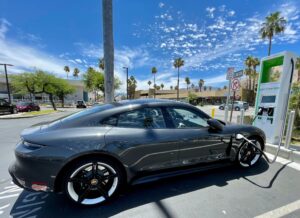Tesla is about to launch its first Indian electric vehicle (EV) plant in Karnataka this year, and with this, India is on track towards a cleaner and greener auto industry. The Economic Times projects the EV market will grow to over 63 lakh units per year by 2027. The Delhi government is targeting a quarter of new vehicles by 2024 to be electric, including a new electric bus fleet.
The National Mission on Electric Mobility incentives as per the FAME (Faster Adoption and Manufacturing of Electric Vehicles in India) scheme to stimulate demand has led to 81,390 vehicles sold to date in Phase II over and above sales in Phase I. The future of EV adoption and resultant lower carbon emissions is positive. But as we anticipate an increase in consumption of the rechargeable Lithium-ion batteries that will power EVs, the pertinent question is: are we adequately prepared for their effective and safe disposal?
EV-Battery-Recycling-InfographicPresent scenario in battery waste management market
It’s estimated that EV batteries will make up 80% of the market share of lithium-ion batteries by 2030. However, recycling being in its infancy, most lithium-ion batteries end up in landfills when they’re spent.
Spent Li-ion batteries are sources of toxic substances like cobalt, graphite, nickel, manganese oxide and electrolytes. They harm the local ecosystem and render the land useless by leaching into the water and soil. Volatile electrolyte components can also lead to explosions in landfills.
“Urban mining” can help to repurpose the raw materials from the recycling of lithium batteries into new batteries, while keeping them out of landfills. A lack of capital and legislation are hurdles to the lithium recycling industry.
The E-Waste Management Rules of 2011, 2016 and the 2018 amendments make no mention of Li-ion batteries or recycling them. The Batteries Management and Handling Rules of 2001 only cover lead-acid batteries.
The rate of adoption of EVs is rising as states adopt electric vehicles policies, which adds to the pressure for thoughtful disposal. Delhi-based NGO ‘Chintan’ reports adding 1,400 electric buses as planned to the city’s present fleet will add 21,000 tonnes of battery waste that will need to be recycled or put to second life use.
The good news is, some steps have been taken in recent years to manage EV battery waste. New entrants to the EV market, ‘MG Motor’, has partnered with Umicore since 2020 for the safe disposal of batteries. ‘Tata Power’ and ‘Exicom’ Tele-Systems have been helping MG Motor make second-life use of their EV batteries in non-vehicular functions.
EV manufacturer ‘eBikeGo’ has run a drive earlier this year to recycle lithium and lead-acid batteries.
Government regulation
The recently proposed draft regulation – ‘Battery Waste Management Rules 2020’ – lays down vital strategies to rectify the unregulated disposal of Li-ion batteries in the country today. However, the draft is still under consideration.
Inspired by successful end-of-life treatment strategies such as in Japan and Germany, the draft will hold manufacturers and dealers responsible for spent battery collection and recycling. The Extended Producer Responsibility (EPR) approach will require battery dealers to keep records of all spent batteries collected. They will need to issue purchase invoices for collected batteries.
At present, there’s no requirement for battery manufacturers to register their businesses. As a result, many small producers aren’t held responsible by the Battery Management and Handling Rules of 2001. They may be collecting used batteries from customers, but no records are maintained. There is also no safe means to transport used batteries to recyclers.
Current players
Recycling of lithium batteries is a global concern today, with extensive research conducted with the environment and economics in mind. Some big players have entered the field recently in India in anticipation of growing demand.
Currently, companies like Attero, Fortum, Exigo Recycling are in the business of recycling lithium batteries from electronic devices. Since May 2021, Attero has paired up with MG Motor Pvt. Ltd. to recycle the auto makers’ current and upcoming EVs.
Tata Chemicals recently launched a pilot for recycling operations at a 3P facility near Mumbai. The goal of the plant is to recycle 500 tonnes of spent batteries in the future.
The country’s largest battery recycler ‘Gravita India’ is also preparing to enter the lithium recycling market.
Mahindra Electric is planning to enable EV battery recycling along the lines of cell phone battery recycling with the help of supply partners.
The capital-intensive recycling industry awaits the burgeoning of demand for EV batteries. In the meantime, anticipation looms for the passing of the new regulations that will bring accountability and legislation to a much-neglected space.
Future scenario
Recycling is not the only means of dealing with spent EV batteries. It is possible to repurpose EV batteries no longer suitable for use in vehicles into stationary batteries for power backup in commercial and residential properties. Batteries that have been retired from EV use still retain around seventy to eighty percent of their capacity. Extending the life of a spent EV battery for an additional 2 to 5 years before recycling can help to maximize energy utilization.
Stationary uses can, to an extent, act as a cushion against the present commercial challenges of recycling.
While Li-ion battery prices drop, incentives to find safer economically viable alternatives may be low. However, alternative battery technologies may ease the burden on Li-ion battery disposal in the future.
The Indian Oil Corp collaboration with Israeli company ‘Phinergy’ to exploit India’s large bauxite reserves for aluminum batteries may provide a safer alternative to Li-ion batteries. However, aluminum cells aren’t rechargeable. The solution proposed by ‘Phinergy’ is to enable quick replacement at filling stations, which can take under three minutes. The spent batteries will go to recyclers from the filling stations.
An environmental conscience and a mix of hype and incentives are driving more people to turn to purchase electric vehicles. There is urgency to connect consumers to EV battery end-of-life treatment services. In the coming years, more players will flood the EV battery waste management industry, creating skilled jobs, maximizing resource utilization and curbing harmful impacts of landfill dumping. These are few reasons which is resulting in higher investments in EV battery recycling industry in India.
For more information and to gain access to the industry report, contact us at support@untappedmarkets.in




